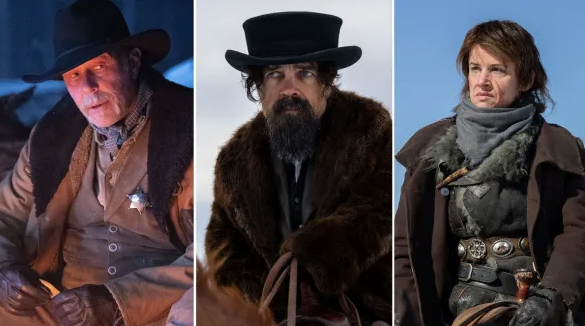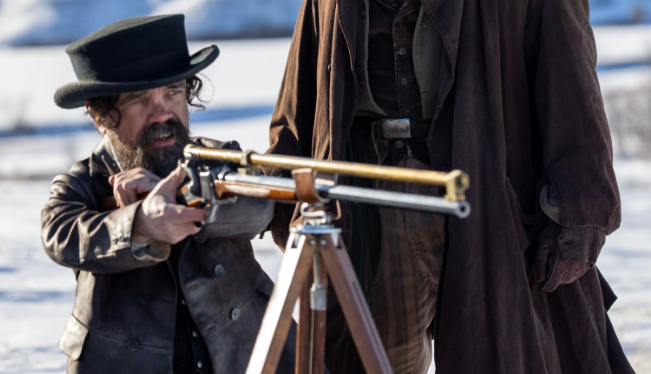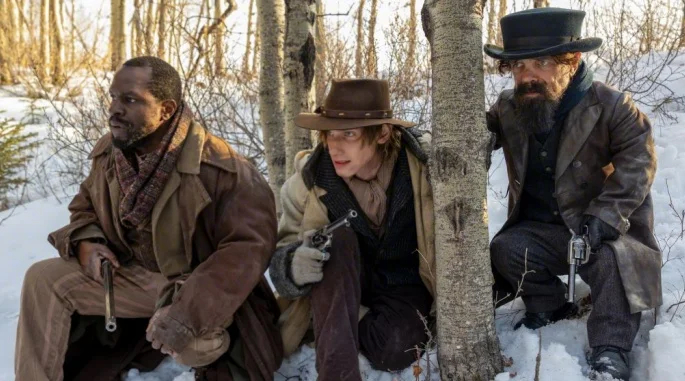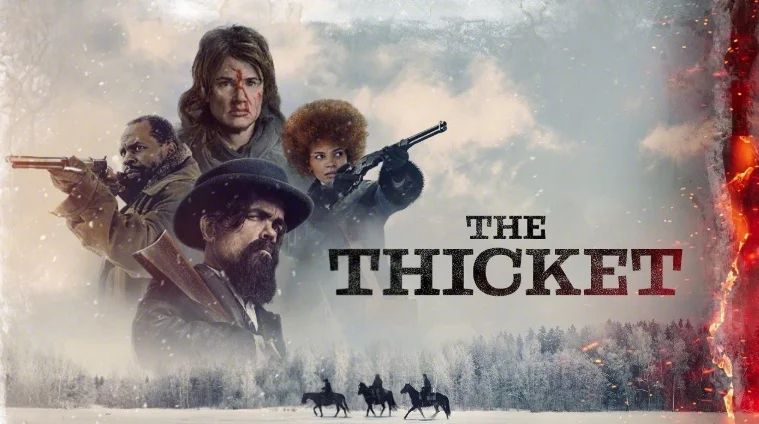The Thicket (2024)
Not all who enter the woods come out the same. Some never do.
🏞️ A Western Reimagined in Ice and Silence
In a genre long dominated by dusty deserts, horse standoffs, and saloon bravado, The Thicket rewrites the Western as a cold, suffocating survival tale — set not beneath a blazing sun, but under gray skies heavy with snow and silence. Director Elliott Lester, adapting Joe R. Lansdale’s novel, crafts a brutal yet poetic journey through the forgotten corners of East Texas, transforming the open frontier into something claustrophobic, haunted, and painfully human.
This is not a story about outlaws and justice. It is a story about desperation, grief, and what people become when all comfort is stripped away and vengeance is the only warmth left to hold on to.
📜 The Story: A Kid, a Killer, and the No-Man’s Land in Between
The film opens on a trauma: Lula Parker, a young woman, is violently kidnapped by the infamous criminal Cut Throat Bill (Juliette Lewis, in a performance as fierce as her name). Her brother, Jack Parker (Levon Hawke), still grieving the loss of their parents, is left behind with nothing but fear, a fading trail… and the will to get her back.
But Jack is no cowboy, no fighter. He’s just a boy. So he hires the only man mad and moral enough to go after her — Reginald “Shorty” Jones, a bounty hunter (Peter Dinklage) with a haunted past, a sharp tongue, and a moral compass that spins between pragmatism and something resembling justice.
Together with Eustace, a former slave turned grave-digger (Gbenga Akinnagbe), and a cunning prostitute who knows how to read both people and danger, the mismatched group sets out into the lawless, frozen wilderness known only as the Thicket — a place of tangled roots, both literal and emotional.
🎭 Characters That Bleed and Breathe
- Peter Dinklage is the soul of this film. As Reginald Jones, he plays not a hero, but a man who has outlived his own mercy. He doesn’t believe in happy endings — just endings. Every line is delivered with exhausted insight, every silence weighted with unspoken memory.
- Levon Hawke brings a fragile, urgent energy to Jack, embodying the tragic loss of innocence. He is not brave — he becomes brave. Not because he wants to be, but because the world offers no other option.
- Juliette Lewis, almost unrecognizable, gives Cut Throat Bill an unpredictable, feral rage. She is not just violent — she is wild, chaotic, unreadable. The camera often lingers on her not to glorify, but to try — and fail — to understand.

The side characters, though briefly seen, feel lived-in, their backstories hinted at in gestures, looks, and passing phrases — a strength of Lester’s directing and the film’s tight script.
🎥 Visuals and Sound: Nature as Antagonist
The cinematography by Guillermo Garza is breathtaking, but not in a romantic way. The snow is not beautiful — it’s isolating. The woods don’t welcome — they swallow. There are no heroic vistas, only encroaching darkness and bone-deep cold. Trees stretch like ribs. Fog crawls like guilt.

The sound design is minimalistic — creaking wood, distant wind, muffled gunshots. The score, used sparingly, relies on dissonant strings and subtle percussion to emphasize dread over triumph. This is not a film where music swells to signal hope — this is a film where silence says, you’re alone.
💭 Themes: Violence, Morality, and the Collapse of Comfort
Beneath the gunpowder and grit, The Thicket is about moral erosion. Each character carries scars not just on their bodies, but in their decisions. Jack starts with a clear goal — save his sister — but along the way learns that justice is murky, and not everyone who kills is wrong… nor is everyone who saves good.
Reginald is the philosophical heart of the film — a man who has killed, buried, and moved on, only to be pulled back into a quest he no longer believes in. His journey is not redemptive — it is a reckoning.

The film also examines gender and power. Lula’s absence is felt in every scene — she becomes less a victim than a haunting presence, her fate motivating but also overshadowing every decision. When she does return to the screen, it is not as a damsel, but as someone changed — perhaps beyond repair.
🧊 Pacing & Structure: A Measured Descent
Unlike modern Westerns that hinge on fast cuts and stylized violence, The Thicket moves slowly — deliberately. It asks you to sit with discomfort, to wade through scenes of tension with no clear release. While this may challenge impatient viewers, it ultimately mirrors the characters’ long, exhausting journey through moral and physical wilderness.
The final act refuses spectacle. No climactic shootout, no easy closure. Just consequence — cold, earned, and final.
✅ Strengths
- Brilliant central performances, especially Dinklage and Lewis, elevating every scene
- Atmosphere and world-building that turns landscape into antagonist
- Complex emotional arcs, particularly in Jack and Reginald
- Thoughtful adaptation of Lansdale’s morally ambiguous source material
❌ Drawbacks
- Slow pacing may alienate viewers expecting traditional Western thrills
- Sparse action compared to its marketing tone
- Lula’s character, though thematically significant, deserved more screen presence and autonomy earlier in the story
🌟 Final Verdict
Rating: 4.5 / 5
The Thicket isn’t here to entertain — it’s here to haunt. It doesn’t offer clean morals or satisfying heroism. What it offers instead is a cold, harrowing, quietly poetic reminder that even in lawless lands, people still carry laws inside them — ones shaped by pain, love, regret, and the impossible hope of doing one thing right… even if it’s too late.

It is, simply, one of the most affecting and artistically daring Westerns in recent memory.
When the snow settles, who are you without the myth? Just a soul, shivering in the thicket.
